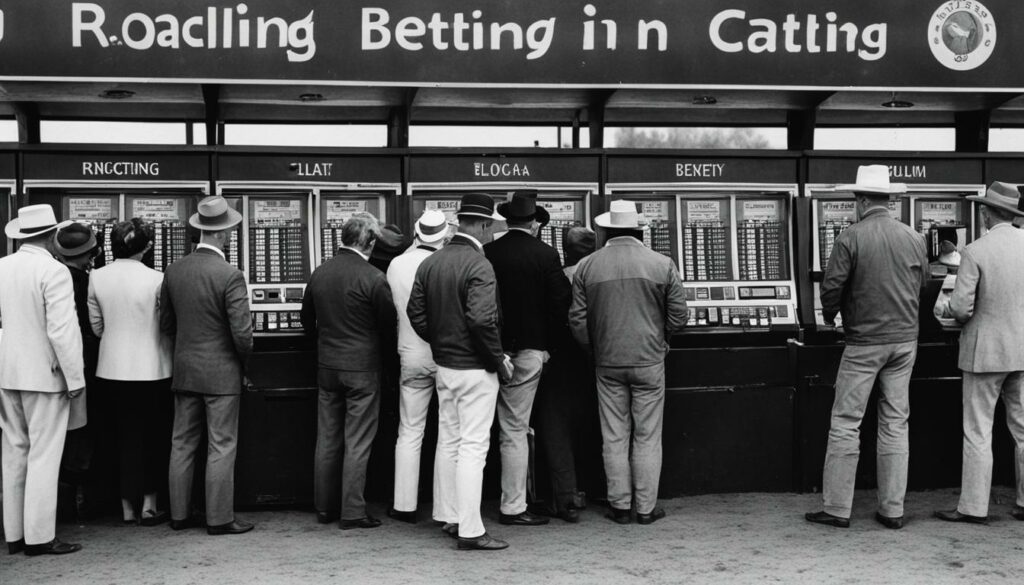If you are a horse owner, you may be wondering whether you can legally place bets on your own horse in racing competitions. The answer is not a straightforward yes or no. As with any form of gambling, there are regulations and restrictions that must be considered.
In this article, we will explore the topic of horse owner betting rights and the betting rules for horse owners. We will cover the different types of horse racing bets and the regulations that govern them. Additionally, we will discuss any legal horse betting for owners and any gambling restrictions for horse owners that may be in place.
It is vital to understand these regulations and potential conflicts of interest to maintain the integrity of the sport and ensure fair competition. Let’s take a closer look at the horse betting regulations that horse owners need to be aware of.
Understanding Horse Racing Bets
Before we look into the specifics of whether horse owners can bet on their own horses, it is important to have a basic understanding of how horse racing bets work. There are various types of bets available, including:
- Win: betting on the horse to finish first
- Place: betting on the horse to finish first or second
- Show: betting on the horse to finish first, second, or third
- Exacta: betting on the two horses to finish first and second in exact order
- Trifecta: betting on the three horses to finish first, second, and third in exact order
It is essential to abide by the relevant horse betting regulations when placing wagers. Horse racing bets are typically governed by state laws, and each state has its own set of rules regarding betting. For example, some states only allow betting on horse races that take place at registered racetracks, while others permit online betting on horse racing events.
It’s important to note that betting on horses can be a challenging and risky activity. It’s recommended to do thorough research and analysis before placing any bets. In the next section, we’ll focus specifically on the rules and regulations surrounding horse owners and their ability to place bets on their horses.
The Role of Ownership in Horse Betting
When it comes to horse betting, owning a horse can have implications on one’s eligibility to place wagers. The rules and regulations surrounding betting rules for horse owners vary from state to state and country to country, so it’s crucial for horse owners to familiarize themselves with the legal horse betting for owners in their particular jurisdiction.
Generally speaking, ownership of a horse should not disqualify an owner from betting on their own horse. However, there may be specific betting rules for horse owners that must be followed, such as restrictions on the types of bets that can be placed or limits on the amount of money that can be wagered. It’s essential to understand these rules to avoid any potential legal consequences.
In addition, it’s worth noting that some countries may have strict gambling restrictions for horse owners to prevent any conflicts of interest or unethical behavior. These may include limits on the percentage of ownership required to be eligible to bet on a horse or outright bans on horse owners gambling on their own horses.

Overall, horse owners should be aware of the betting rules for horse owners and legal restrictions surrounding horse betting. Seeking guidance from racing authorities or consulting with legal professionals can help ensure compliance and avoid any conflicts of interest.
Potential Conflicts of Interest
When horse owners bet on their own horses, potential conflicts of interest can arise, creating a perception of unfairness and compromising the integrity of the sport. As such, many horse racing authorities have implemented measures to manage and regulate these conflicts.
One such measure is requiring horse owners to disclose their wagers to the public and racing officials. This transparency helps to ensure that no horse owner has an unfair advantage over others and maintains a level playing field for all competitors.
Additionally, some racing authorities prohibit horse owners from betting on their horses to win and may only allow them to place exotic bets, such as exactas and trifectas, to minimize the risks of collusion or tampering.
Ultimately, these regulations strive to maintain the fairness and credibility of the horse racing industry while allowing horse owners to participate in the excitement of wagering on their own horses.
Example:
“As a horse owner, I understand the importance of maintaining the integrity of the sport. While betting on my own horse is certainly enticing, I believe it is critical to prioritize fair competition and transparency within the industry.”
– Sarah Smith, owner of Belle Vue Stables
Gambling Restrictions for Horse Owners
When it comes to gambling on their own horses, horse owners must be mindful of any specific restrictions or limitations that may be in place. Depending on the jurisdiction and the specific event, there may be additional regulations that horse owners must adhere to when placing bets.
For instance, some states prohibit horse owners from betting on their horses entirely, while others require them to register with the racing commission and disclose any financial interest they have in the outcome of the race. Additionally, some racetracks may implement rules that restrict the amount of money a horse owner can wager on their own horse.
It is important for horse owners to familiarize themselves with the racing regulations in their area to avoid any potential legal issues or penalties. Seeking legal advice can also help ensure that horse owners are within the bounds of the law.
Overall, while horse racing can be an exciting and rewarding sport for both owners and bettors, it is essential to respect the rules and regulations in place to uphold the integrity of the industry.
Legal Considerations for Horse Owners
When it comes to horse racing, there are specific laws and regulations that horse owners must adhere to when placing bets on their horses. It is essential for horse owners to be aware of these legal considerations to avoid any potential legal consequences.
There may be specific restrictions on how much horse owners can bet and the types of bets they can place. It is also important to note that betting on their own horse may be considered a conflict of interest. Owners must consider whether betting on their own horse may inappropriately influence their behavior and potentially damage the integrity of the sport.
Additionally, horse owners should familiarize themselves with the gambling laws in their state or region as they may differ from one place to another. These laws may also impose specific taxation or licensing requirements that horse owners must comply with.
Ensuring compliance with the relevant horse betting regulations and laws is crucial for horse owners. By doing so, horse owners can avoid potential legal consequences and participate in the sport in a fair and ethical manner.
Seeking Clarity from Racing Authorities
For horse owners who are unsure about their rights and responsibilities when it comes to betting on their horses, racing authorities can offer valuable guidance and support. These authorities can provide information about the specific betting rules for horse owners and any limitations or restrictions that may apply.
In addition to seeking guidance from the racing authorities, horse owners can access a variety of resources to ensure compliance with the regulations. For example, many websites offer the latest news and updates about horse racing bets, allowing owners to stay informed about any changes or developments. Furthermore, legal advisors can help horse owners navigate the complex legal landscape of horse betting regulations.
By seeking clarity from racing authorities and utilizing these resources, horse owners can enjoy the excitement of horse racing bets while adhering to the established rules and regulations.

Betting on Your Own Horse: A Complex and Dynamic Landscape
Betting on your own horse as a horse owner is a complex and dynamic undertaking. It is therefore crucial for horse owners to have a deep understanding of the betting rules for horse owners and any restrictions or limitations that may apply. The resources provided by racing authorities can help horse owners navigate this landscape effectively.
“Horse owners who bet on their own horses must be familiar with the relevant regulations and legislation to ensure compliance and maintain the integrity of the sport.”
| Betting Rules for Horse Owners: | Notes: |
|---|---|
| Horse owners can legally bet on their own horses. | However, some restrictions may apply, such as prohibitions on certain types of bets or limitations on the amount that can be wagered. |
| Horse owners must comply with all applicable regulations and legislation. | Failing to do so can result in sanctions or even legal action. |
| Conflict of interest concerns must be managed. | To maintain the integrity of the sport, horse owners must take steps to manage any potential conflicts of interest that arise from betting on their own horses. |
In summary, horse owners who wish to bet on their own horses should seek guidance from racing authorities, stay informed about the latest news and developments in the industry, and work closely with legal advisors to ensure compliance with all relevant regulations. By doing so, horse owners can enjoy the excitement of horse racing bets while maintaining the integrity of the sport.
Conclusion
When it comes to horse racing, many horse owners may wonder if they are allowed to place bets on their own horses. After exploring the relevant regulations and rules, the answer is not a simple yes or no. It is essential to understand the specific restrictions and limitations that may apply to horse owners when it comes to gambling on their horses.
By familiarizing themselves with the betting rules and seeking legal advice if needed, horse owners can ensure they are within the bounds of the law. Doing so is not only crucial for their rights as a horse owner, but also for the integrity of the sport.
So, can horse owners bet on their horse? The answer is dependent on several factors and can vary from state to state. As such, it is crucial for horse owners to seek clarity from racing authorities and ensure they are complying with the rules and regulations. By doing so, they can enjoy the excitement of horse racing while also upholding the integrity of the sport.
FAQ
Can horse owners bet on their horse?
Yes, horse owners are generally allowed to bet on their own horses in horse racing events. However, there may be certain regulations and betting rules that they need to abide by.
What are the regulations and rules for horse betting?
Horse betting regulations may vary depending on the jurisdiction. Generally, there are rules governing the types of bets that can be placed, the minimum age for betting, and any restrictions on insider information or conflicts of interest. It is important for horse owners to familiarize themselves with the specific regulations in their location.
Does ownership of a horse affect the ability to place bets?
Ownership of a horse does not typically affect one’s ability to place bets. However, it is important for horse owners to be aware of any potential conflicts of interest and to ensure fair competition and integrity in the sport.
What are potential conflicts of interest when horse owners bet on their own horses?
When horse owners bet on their own horses, there is a potential conflict of interest as they have a personal stake in the outcome of the race. This can raise concerns about fair competition and the integrity of the sport. Racing authorities have systems in place to manage and regulate these conflicts to maintain a level playing field.
Are there any specific gambling restrictions for horse owners?
There may be specific gambling restrictions or limitations imposed on horse owners when it comes to betting on their own horses. These restrictions can vary depending on the jurisdiction and the specific racing authority. Horse owners should familiarize themselves with the rules and regulations in their location.
What are the legal considerations for horse owners when it comes to betting?
Horse owners need to understand the legal implications of betting on their horses. They must ensure compliance with any applicable laws or regulations to avoid legal consequences. It is advisable for horse owners to seek legal advice to understand their rights and responsibilities in relation to horse betting.
How can horse owners seek clarity about their betting rights?
Horse owners can seek clarity about their betting rights by consulting the racing authorities or regulatory bodies responsible for overseeing horse racing in their jurisdiction. These organizations can provide guidance on the specific rules and regulations horse owners need to follow when betting on their own horses.












